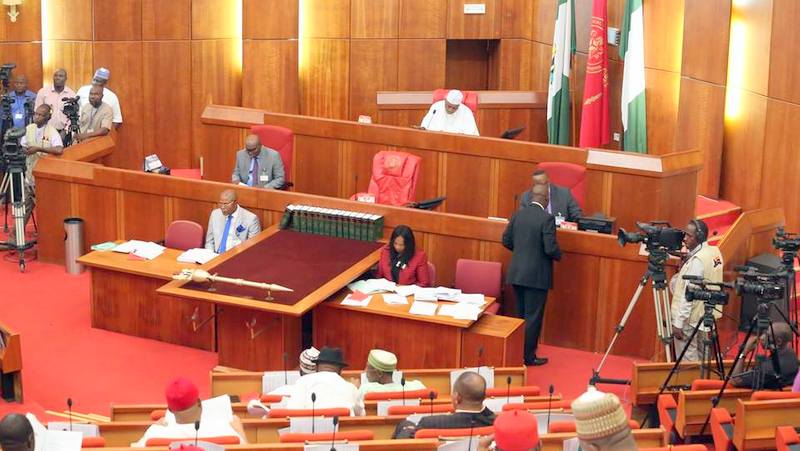Presidential Election Expenses Must Not Exceed N5bn —Senate
Ahead of the 2019 presidential and general elections, the Senate has said election expenses for presidential election should not exceed N5 billion, following amendment of section 91 of 2010 Electoral Act and Amendment.
The Senate also said no gubernatorial candidate should during the election spend above N1 billion; senatorial candidate, N100 million; House of Representatives, N70 million; State House of Assembly, N30 million; LG chairman, N30 million and councillorship, not above N5 million, in line with amendment of sections 91(1to 7) .
According to the amendment, no individual or other entity shall donate to a candidate more that N10,000,000.000. Section 91(10) stipulates that “ a candidate who knowingly acts in contravention of this section, commits an offence and is liable on conviction to a fine of one per cent of the amount permitted as the limit of campaign expenditure under this Act or Imprisonment for a term not exceeding 12 months or both.’’
These followed the presentation of lead debate on A Bill for an Act to Amend the Independent National Electoral Commission, INEC, Act 2010 and for other matters connected therewith, 2018 (SB. 699) as presented by the Chairman, Senate Committee on INEC, Senator Suleiman Nazif (Bauchi North).
The bill was, however, read the second time and the Senate President, Dr. Bukola Saraki, referred it to the Committee on INEC to report back next Tuesday.
In his presentation, Nazif, who recalled that the bill was passed by the National Assembly before it proceeded on its annual recess on July 24 and transmitted for assent but was declined by President Muhammadu Buhari, said the President had given reasons for declining assent, adding that the observations had been noted.
According to him, Buhari has made observations of “cross referencing error, fears of increased cost of conducting elections”, among others.
Contributing, some lawmakers raised objections to some of the provisions in the proposed amendment bill, saying they were unimplementable.
The Deputy President of the Senate, Ike Ekweremadu, who raised concern on some sections of the bill, said: “I am worried about item seven which is Section 140 (5).
It reads, ‘if at the point of display or distribution of ballot papers by the commission, a candidate or his agent discovers that his name, name or logo of his party is omitted, a candidate or his agent shall notify the commission.
‘’The commission shall: a. Cancel the election to rectify the omission, b. Appoint another date for the election.
“I think this is very dangerous, because what happens is that somebody who believes he will lose the election will raise an objection without even consulting the other candidates, and write to INEC.
“INEC now believes him and then postpones the election, which now becomes an isolated election where you cannot determine what will happen. I think this would be unfair to the rest candidates.
“So, I suggest that sample ballot papers should be displayed before the election to give candidates and their parties room to make their inputs before election day, rather than wait till election day for objections to be raise.”
On his part, Senator James Manager, PDP, Delta South, said there was need to do a thorough job on the bill to enable the President assent to it this time, adding that it was the fourth time the bill was being worked on by the legislature.
Manager said: “Some of the amendments raised are very technical and dangerous. I advise that when this is referred to the committee, it should check all the views expressed here, including those not expressed, and come up with something that’s acceptable. “Besides, who is going to enforce this? So, we should look at it holistically. What we have here is something that’s completely unimplementable. We should be able to make laws that can be implemented.”
Also contributing, Senator Kabiru Gaya said “the issues raised by the President are vital, and the committee said they would look into them. I believe the committee should come up with all the areas for us to discuss.”
Senator Joshua Lidani said in his reaction: “I don’t know why we’re bringing INEC to meddle in the issue of candidates. INEC doesn’t have anything to do with what the parties decide since they’re the only ones that can forward names of candidates for elections.”
In his contribution, Senator Ali Ndume said: “Mine is more of an observation. I want to add to what the DSP said on the omission of logos. Prior to election day, a copy of the ballot papers should be made available to political parties to check their names and logos. ‘’If we allow it to go like this, there will be room for manipulation. A sample of the ballot paper should be displayed two weeks to the election for all parties to see.”
On his part, Senator George Akume said: “I want to draw attention to section 87 on parties’ nomination. It is an undue interference in the affairs of political parties.”
In his remarks, the President of the Senate, Dr Bukola Saraki, directed the Committee on INEC to work on the proposed amendment bill and report back to Senate within seven days further legislative action. The Bill was referred to the committee on INEC to report back on Tuesday. Recall that this is the fourth attempt the lawmakers are working to have the bill assented to by President Muhammadu Buhari.
President Muhammadu Buhari had on September 3, declined assent to the Electoral Act(Amendment) Bill, 2018, transmitted to him by the National Assembly on August 3 for the third time.




